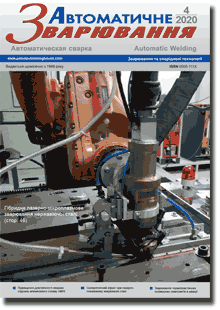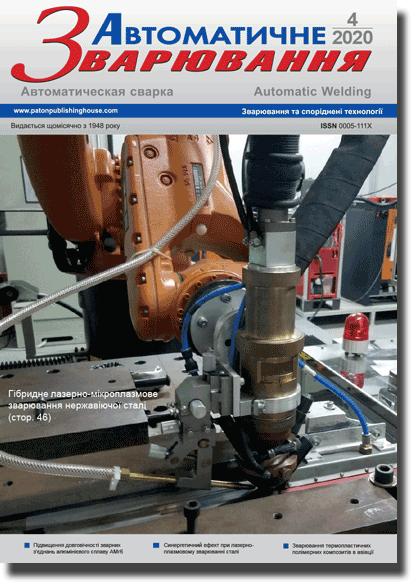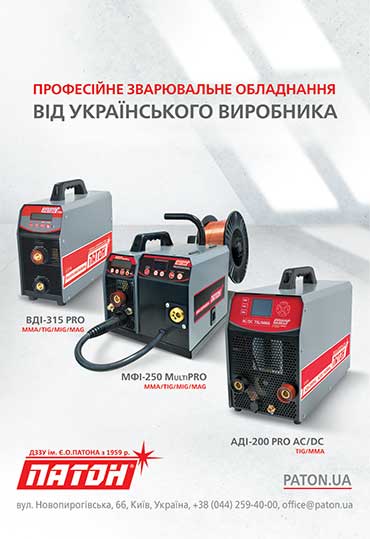| 2020 №04 (06) |
DOI of Article 10.37434/as2020.04.01 |
2020 №04 (02) |

"Avtomatychne Zvaryuvannya" (Automatic Welding), #4, 2020, pp.3-10
Increase in the life of welded joints of AMG6 aluminum alloy
L.M. Lobanov, M.O. Pashchyn, O.M. Tymoshenko, P.V. Goncharov, O.L. Mikhoduj, K.V. Shiyan
E.O. Paton Electric Welding Institute of the NAS of Ukraine, 11 Kazymyr Malevych Str., 03150, Kyiv, Ukraine. E-mail: office@paton.kiev.ua
The effect of electrodynamic action on the life of welded joints of AMg6 aluminum alloy under cyclic loading was investigated. It was found that electrodynamic treatment of specimens of butt welded joints of AMg6 alloy results in reduction in residual tensile welding stresses, which is followed by their transition to compression. It is shown that as a result of double-sided singlechannel electrodynamic surface treatment in welded joints of AMg6 alloy, the cyclic life is three times increased as compared to the initial one. Additional electrodynamic treatment of the fusion line increases the life by five times as compared to the non-treated metal. In the comparative evaluation of single- and two-channel electrodynamic treatment of samples, it was found that the increase in life when using a two-channel scheme (as compared to single-channel) is determined by the controlled synchronization of components of electrodynamic effect, which eliminates the passage of electric current pulse through its treated metal in the phase of its attenuation. It was shown that the life of two-channel treated specimens with electric pulsed action is more than 50% higher than that of the dynamic ones, which is connected with the contribution of electroplastic effect to the reduction of residual welding stresses. 8 Ref., 4 Tabl., 5 Fig.
Keywords: electrodynamic treatment, electrode device, single- and two-channel scheme, residual welding stresses, aluminum alloys, life, electric current pulse, cycle amplitude
Received: 13.03.2020
References
1. Knysh, V.V. (2014) Determination of cyclic life of structure elements in arresting fatigue cracks. The Paton Welding J., 9-10, 69-71.2. Knysh, V.V., Klochkov, I.N., Pashulya, M.P., Motrunich, S.I. Increase of fatigue resistance of sheet welded joints of aluminium alloys using high-frequency peening. Ibid., 5, 22-29.
3. Finkel, V.M., Ivanov, V.M., Golovin, Yu.I. (1983) Crack healing in metals by crossed electric and magnetic fields. Problemy Prochnosti, 4, 54-58 [in Russian]. https://doi.org/10.1007/BF01522429
4. Lobanov, L.M., Pashchin, N.A., Solomijchuk, T.G. et al. (2012) Changes of structure of AMg6 aluminium alloy in electrodynamic effects. Visnyk Ukrainskogo Material. Tovarystva, 5, 30-42 [in Russian].
5. Lobanov, L.M., Pivtorak, V.A., Savitsky, V.V., Tkachuk, G.I. (2006) Procedure for determination of residual stresses in welded joints and structural elements using electron speckleinterferometry. The Paton Welding J., 1, 10-13.
6. Lobanov, L.M., Pashchin, N.A., Yashchuk, V.A., Mikhodui, O.L. (2015) Effect of electrodynamic treatment on the fracture resistance of the AMg6 aluminum alloy under cyclic loading. Strength of Materials, 3, 91-98. https://doi.org/10.1007/s11223-015-9676-5
7. Yakovleva, T.Yu. (2003) Local plastic deformation and fatigue of metals. Kiev, Naukova Dumka [in Russian].
8. Baranov, Yu.V., Troitsky, O.A., Avramov, Yu.S. (2001) Physical principles of electropulsed and electroplastic treatments and new materials. Moscow, MGIU [in Russian].
Advertising in this issue:
The cost of subscription/purchase order journals or individual articles
| Journal/Currency | Annual Set | 1 issue printed |
1 issue |
one article |
| TPWJ/USD | 384 $ | 32 $ | 26 $ | 13 $ |
| TPWJ/EUR | 348 € | 29 € | 24 € | 12 € |
| TPWJ/UAH | 7200 UAH | 600 UAH | 600 UAH | 280 UAH |
| AS/UAH | 1800 UAH | 300 UAH | 300 UAH | 150 UAH |
| AS/USD | 192 $ | 32 $ | 26 $ | 13 $ |
| AS/EUR | 180 € | 30 € | 25 € | 12 € |
| SEM/UAH | 1200 UAH | 300 UAH | 300 UAH | 150 UAH |
| SEM/USD | 128 $ | 32 $ | 26 $ | 13 $ |
| SEM/EUR | 120 € | 30 € | 25 € | 12 € |
| TDNK/UAH | 1200 UAH | 300 UAH | 300 UAH | 150 UAH |
| TDNK/USD | 128 $ | 32 $ | 26 $ | 13 $ |
| TDNK/EUR | 120 € | 30 € | 25 € | 15 € |
AS = «Automatic Welding» - 6 issues per year;
TPWJ = «PATON WELDING JOURNAL» - 12 issues per year;
SEM = «Electrometallurgy Today» - 4 issues per year;
TDNK = «Technical Diagnostics and Non-Destructive Testing» - 4 issues per year.







